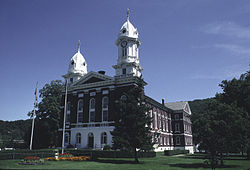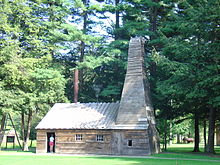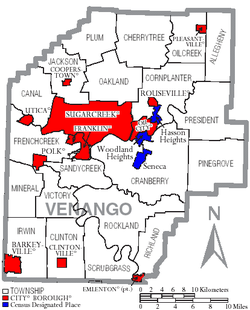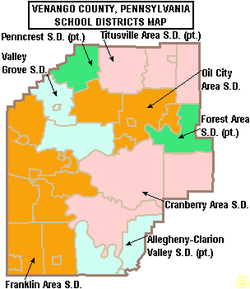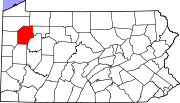- Venango County, Pennsylvania
-
Venango County, Pennsylvania Venango County Courthouse
Seal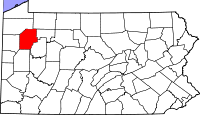
Location in the state of Pennsylvania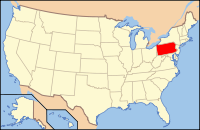
Pennsylvania's location in the U.S.Founded March 12, 1800 Seat Franklin Largest city Oil City Area
- Total
- Land
- Water
683 sq mi (1,769 km²)
675 sq mi (1,748 km²)
8 sq mi (21 km²), 1.17%Population
- (2010)
- Density
54,984
81/sq mi (31.4/km²)Website www.co.venango.pa.us Venango County is a county located in the U.S. state of Pennsylvania. As of the 2010 census, the population was 54,984. Its county seat is Franklin[1].
Contents
History
Venango County was created on March 12, 1800 from parts of Allegheny and Lycoming Counties. The origination of the name "Venango" comes from as it was known to Native Americans of the region as Onenge, meaning Otter. This was corrupted into English as the Venango River.[2] The settlement at its mouth was likewise called Venango, and is the site of present-day Franklin, Pennsylvania.
Venango County was home to an oil boom in the years following discovery of natural oil (petroleum) in the mid 1850s.
George Bissell, a Yale University Chemistry professor, and Edwin L. Drake, a former railroad conductor, made the first successful use of a drilling rig on August 28, 1859 near Titusville, Pennsylvania. (Although Titusville is in Crawford County, the first oil well was drilled outside of town, less than a mile inside of the Venango County boundary.) This single well soon exceeded the entire cumulative oil output of Europe since the 1650s. Within weeks oil derricks were erected all over the area. Other oil boom towns located in Venango County included Franklin, Oil City, and the now defunct Pithole City The principal product of the oil was kerosene.
McClintocksville was a small community in Cornplanter Township in Venango County. In 1861, it was the location of Wamsutta Oil Refinery, the first business venture of Henry Huttleston Rogers, who became a leading United States capitalist, businessman, industrialist, financier, and philanthropist. Rogers and his young wife Abbie Palmer Gifford Rogers lived in a one room shack there along Oil Creek for several years beginning in 1862.
Shortly later, Rogers met oil pioneer Charles Pratt who purchased the entire output of the tiny Wamsutta Oil Refinery. In 1867, Rogers joined Pratt in forming Charles Pratt and Company, which was purchased by Standard Oil in 1874. Rogers became one of the key men in John D. Rockefeller’s Standard Oil Trust.
After joining Standard Oil, Rogers invested heavily in various industries, including copper, steel, mining, and railways. The Virginian Railway is widely considered his final life's achievement. Rogers amassed a great fortune, estimated at over $100 million, and became one of the wealthiest men in the United States. He was also a generous philanthropist, providing many public works for his hometown of Fairhaven, Massachusetts, and financially assisting helping such notables as Mark Twain, Helen Keller, and Dr. Booker T. Washington.
Perhaps in one of history's ironies, another resident of Venango County about the same time as Henry and Abbie Rogers was a little girl named Ida M. Tarbell, whose father was an independent producer whose small business was ruined by the South Improvement Company scheme of 1871 and the conglomerate which became Standard Oil. Introduced to each other in 1902 by their mutual friend Mark Twain, Tarbell who had become an investigative journalist and Rogers, who knew of her work, shared meetings and information over a two year period which led to her epoch work, The History of the Standard Oil Company, published in 1904, which many historians feel helped fuel public sentiment against the giant company and helped lead to the court-ordered break-up of it in 1911.
The oil heritage of Venanago County is remembered by a Pennsylvania State Park and many heritage sites which help tell the story and memorialize the people of the oil boom of the late 19th and early 20th centuries.
Geography
According to the U.S. Census Bureau, the county has a total area of 683 square miles (1,769 km²), of which 675 square miles (1,748 km²) is land and 8 square miles (21 km²) (1.17%) is water.
Adjacent counties
- Crawford County (northwest)
- Warren County (north)
- Forest County (northeast)
- Clarion County (east)
- Butler County (south)
- Mercer County (west)
Significant Topographic features
French Creek is formed near French Creek, New York and extends for a length of 117 miles (188 km) with a drainage area of 1,270 square miles (3,289 km²). It joins the Allegheny River near Franklin, Pennsylvania. The watershed area includes parts of Erie, Crawford, Venango, and Mercer Counties in Pennsylvania as well as Chautauqua County, New York.
Demographics
Historical populations Census Pop. %± 1800 1,130 — 1810 3,060 170.8% 1820 4,915 60.6% 1830 9,470 92.7% 1840 17,900 89.0% 1850 18,310 2.3% 1860 25,043 36.8% 1870 47,925 91.4% 1880 43,670 −8.9% 1890 46,640 6.8% 1900 49,648 6.4% 1910 56,359 13.5% 1920 59,184 5.0% 1930 63,226 6.8% 1940 63,958 1.2% 1950 65,328 2.1% 1960 65,295 −0.1% 1970 62,353 −4.5% 1980 64,444 3.4% 1990 59,381 −7.9% 2000 57,555 −3.1% 2010 54,984 −4.5% [3][4] As of the census[5] of 2000, there were 57,565 people, 22,747 households, and 15,922 families residing in the county. The population density was 85 people per square mile (33/km²). There were 26,904 housing units at an average density of 40 per square mile (15/km²). The racial makeup of the county was 97.64% White, 1.09% Black or African American, 0.18% Native American, 0.23% Asian, 0.02% Pacific Islander, 0.17% from other races, and 0.67% from two or more races. 0.52% of the population were Hispanic or Latino of any race. 33.0% were of German, 12.7% Irish, 12.2% American, 8.6% English, 5.7% Polish and 5.3% Italian ancestry according to Census 2000.
There were 22,747 households out of which 30.40% had children under the age of 18 living with them, 55.80% were married couples living together, 9.90% had a female householder with no husband present, and 30.00% were non-families. 26.20% of all households were made up of individuals and 12.50% had someone living alone who was 65 years of age or older. The average household size was 2.45 and the average family size was 2.93.
In the county, the population was spread out with 24.20% under the age of 18, 7.20% from 18 to 24, 26.70% from 25 to 44, 25.10% from 45 to 64, and 16.80% who were 65 years of age or older. The median age was 40 years. For every 100 females there were 95.40 males. For every 100 females age 18 and over, there were 92.10 males.
In the 2004 United States presidential election, voters registered in Venango County cast 9,024 (38.1%) ballots for Kerry, 14,472 (61.2%) for Bush, and 163 (0.7%) for "other".
Law And Government
Pennsylvania State Senate
Pennsylvania House of Representatives
United States House of Representatives
- G.T. Thompson, Republican, Pennsylvania's 5th congressional district
Municipalities
Under Pennsylvania law, there are four types of incorporated municipalities: cities, boroughs, townships, and, in at most two cases, towns. The following cities, boroughs and townships are located in Venango County:
Cities
- Franklin
- Oil City
Boroughs
Townships
- Allegheny
- Canal
- Cherrytree
- Clinton
- Cornplanter
- Cranberry
- Frenchcreek
Census-designated places
Census-designated places are geographical areas designated by the U.S. Census Bureau for the purposes of compiling demographic data. They are not actual jurisdictions under Pennsylvania law. Other unincorporated communities, such as villages, may be listed here as well.
- Hasson Heights
- Petroleum Center
- Seneca
- Woodland Heights
Industry and commerce
Major employers
Pennzoil and Quaker State left the Venango area for Texas. After leaving the area they merged and stopped refining oil. They now concentrate on retail oil and automotive additives produced for them by other companies. As of 2007, the two companies only exist as brand names after the company disappeared because of successive mergers.
With global crude oil prices touching US $100 in early 2008, long-dormant interest reawakened in Venango County's remaining oil reserves, 70% undrilled by one estimate. High prices make less accessible oil deposits worth extracting. For instance, a Canadian firm proposed drilling several large mines and allowing oil to flood the tunnels.[6]
Other major employers are Government (at all levels) and Walmart.
Venango Area Chamber of Commerce
Transportation
Education
Public school districts
- Cranberry Area School District
- Franklin Area School District
- Oil City Area School District
- Titusville Area School District
- Valley Grove School District
Partial districts
These public school districts are only partially in Venango County:
- Allegheny-Clarion Valley School District
- Forest Area School District
- Penncrest School District
Colleges and universities
- Clarion University, Venango Campus
- Dubois Business College
- Penn State University Venango County Co-Op Extension
Sports and recreation
Pennsylvania State Parks and Forests
Attractions and Tourism
- DeBence Antique Music World
- Oil Region Astronomical Observatory
- Franklin Silver Cornet Band
- Franklin Public Library. The Franklin Public Library was founded in 1894 and has had several homes, although its current location on Twelfth Street in Franklin, Venango County, PA has been its home since 1921. The original structure on Twelfth Street was built in 1849 as a residence and required extensive renovations in 1921 to make it suitable for library use.
Venango Area Chamber of Commerce
Notable people
- Orrin Dubbs Bleakley
- John Wilkes Booth
- Cornplanter
- William Holmes Crosby, Jr.
- Hildegarde Dolson
- Frank Evans
- Gabby Gabreski
- Leon H. Gavin
- Alexander Hays
- Johnny Appleseed
- Kathryn Kuhlman
- Ted Marchibroda
- Jesse L. Reno
- Henry H. Rogers
- Joseph Sibley
- Peter Moore Speer
- Ida M. Tarbell
- John Wesley Van Dyke
See also
- List of municipal authorities in Venango County, Pennsylvania
- Oil Creek Library District
- Oil Region
External links
- Venango County Government Home Page
- Venango County interactive map
- Venango County History and Genealogy Archive
References
- ^ "Find a County". National Association of Counties. http://www.naco.org/Counties/Pages/FindACounty.aspx. Retrieved 2011-06-07.
- ^ Donehoo, George (1995). "French Creek". Indian Villages and Place Names in Pennsylvania. Gateway Press. http://www.crawfordcopa.com/history/FrenchCk.html. Retrieved 24-Jan-2007.
- ^ http://factfinder2.census.gov
- ^ http://mapserver.lib.virginia.edu/
- ^ "American FactFinder". United States Census Bureau. http://factfinder.census.gov. Retrieved 2008-01-31.
- ^ "As Oil Prices Soar, Prospectors Return to Pennsylvania". The Wall Street Journal. February 19, 2008. Archived from the original on 2008-02-28. http://web.archive.org/web/20080228114948/http://www.energybulletin.net/40819.html. Retrieved 2008-02-25.
Municipalities and communities of Venango County, Pennsylvania Cities Boroughs Barkeyville | Clintonville | Cooperstown | Emlenton‡ | Pleasantville | Polk | Rouseville | Sugarcreek | Utica
Townships CDPs Unincorporated
communityGhost town Footnotes ‡This populated place also has portions in an adjacent county or counties
 Commonwealth of Pennsylvania
Commonwealth of PennsylvaniaTopics - Cities
- Politics
- Government
- Delegations
- History
- Geography
- Geology
- Pennsylvanians
- State parks
- Symbols
- Visitor attractions
Metro areas Cities Largest
municipalities- Baldwin
- Berwick
- Bethel Park
- Brentwood
- Carlisle
- Chambersburg
- Columbia
- Darby
- Dunmore
- Elizabethtown
- Emmaus
- Ephrata
- Franklin Park
- Hanover
- Indiana
- Kingston
- Lansdale
- Lansdowne
- Monroeville
- Munhall
- Murrysville
- Norristown
- Penn Hills
- Phoenixville
- Plum
- Pottstown
- State College
- West Chester
- West Mifflin
- Whitehall
- Wilkinsburg
- Wyomissing
- Yeadon
Regions - Allegheny Mountains
- Allegheny National Forest
- Allegheny Plateau
- Atlantic Coastal Plain
- Blue Ridge
- Coal Region
- Cumberland Valley
- Delaware Valley
- Dutch Country
- Endless Mountains
- Happy Valley
- Laurel Highlands
- Lehigh Valley
- Main Line
- Northeast
- Northern Tier
- Northwestern
- Oil Region
- Pennsylvania Highlands
- Piedmont
- The Poconos
- Ridge and Valley
- South Central
- Susquehanna Valley
- Western
- Wyoming Valley
Counties - Adams
- Allegheny
- Armstrong
- Beaver
- Bedford
- Berks
- Blair
- Bradford
- Bucks
- Butler
- Cambria
- Cameron
- Carbon
- Centre
- Chester
- Clarion
- Clearfield
- Clinton
- Columbia
- Crawford
- Cumberland
- Dauphin
- Delaware
- Elk
- Erie
- Fayette
- Forest
- Franklin
- Fulton
- Greene
- Huntingdon
- Indiana
- Jefferson
- Juniata
- Lackawanna
- Lancaster
- Lawrence
- Lebanon
- Lehigh
- Luzerne
- Lycoming
- McKean
- Mercer
- Mifflin
- Monroe
- Montgomery
- Montour
- Northampton
- Northumberland
- Perry
- Philadelphia
- Pike
- Potter
- Schuylkill
- Snyder
- Somerset
- Sullivan
- Susquehanna
- Tioga
- Union
- Venango
- Warren
- Washington
- Wayne
- Westmoreland
- Wyoming
- York
Categories:- Pennsylvania counties
- Venango County, Pennsylvania
- 1800 establishments in the United States
- Populated places established in 1800
Wikimedia Foundation. 2010.

